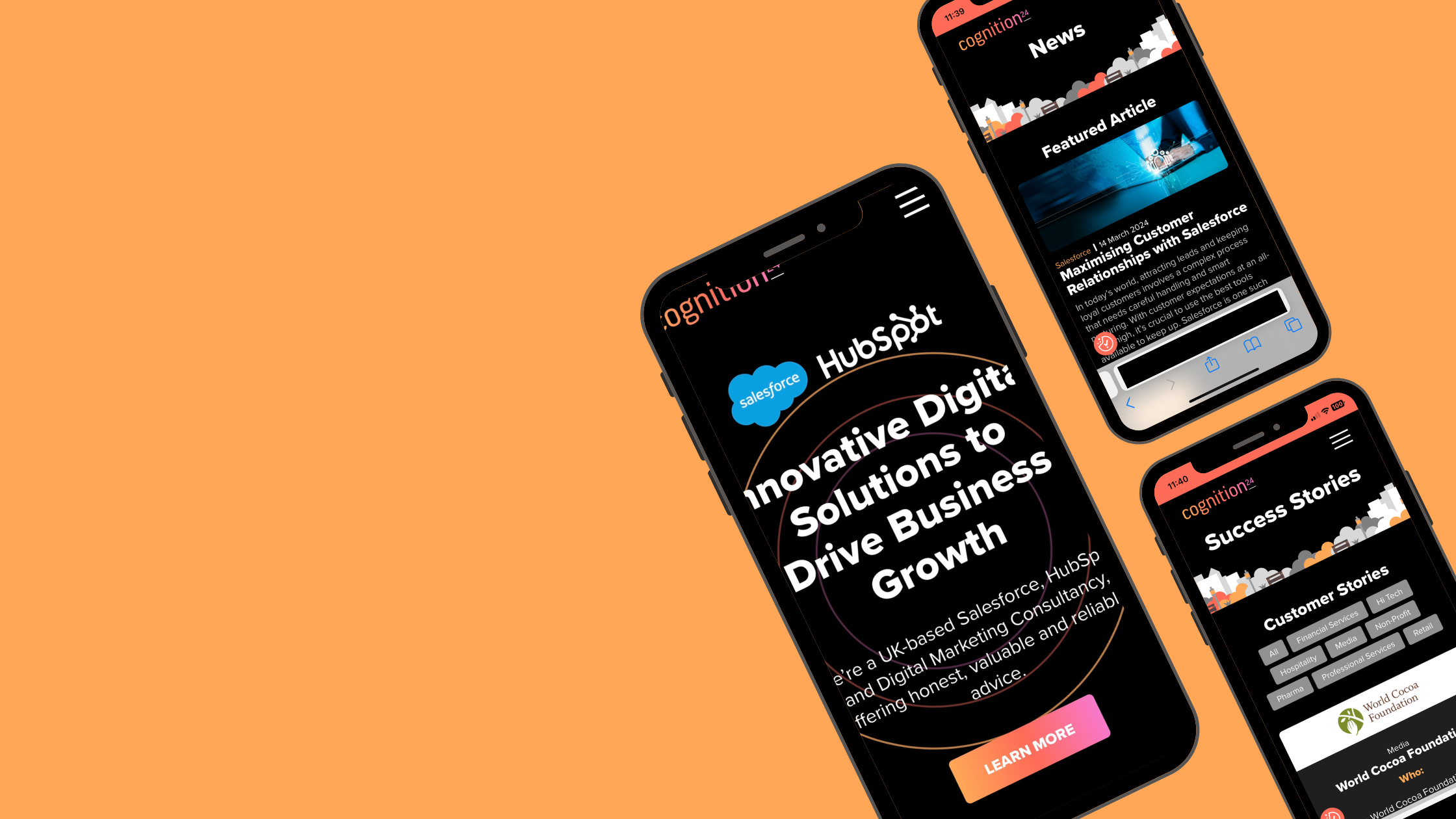Featured Article
All

22 April 2024
Managed Services
Efficiency and Success with Salesforce Managed Services

18 April 2024
Marketing
End-to-End Digital Marketing Services: The Secret to Success

15 April 2024
Marketing
Digital Marketing Solutions that Drive Results

12 April 2024
HubSpot
The Power of Personalised Email Campaigns with HubSpot

9 April 2024
Cognition24
Evolving with Purpose: The Story Behind Our Website Rebrand

2 April 2024
SMB
Salesforce for Small Business: Tips and Tricks

14 March 2024
Salesforce
Building Customer Relationships with Salesforce

13 March 2024
HubSpot
Website Design: Essential Tips and Tricks with HubSpot

12 March 2024
Artificial Intelligence
Salesforce AI: Unlock the Power

26 February 2024
Interim Services
Future‑Proofing Your Business: CRM, Consultants, and Interim CTOs

22 February 2024
HubSpot
A Guide to Choosing Your Ideal HubSpot Partner for Business Success

19 February 2024
Interim Services
Navigating Innovation: Choosing the Right Interim CTO to Steer Your Tech Ship

13 February 2024
HubSpot, Salesforce
Choosing Between Salesforce and HubSpot?

20 November 2023
HubSpot
Marketing Automation with Hubspot

15 November 2023
Customer Experience
The Ultimate Guide to Customer Acquisition

14 November 2023
Interim Services
Maximising Growth: The Crucial Role of an Interim CTO in Your Growing Business

8 November 2023
Interim Services, Marketing
Empowering Revenue Ops Excellence: Essential Tools for Success

6 November 2023
HubSpot, Salesforce
Unlocking Synergy: Salesforce and HubSpot Integration

2 November 2023
Cognition24
Cognition24 and Aedon Accounting Join Forces in an Implementation Partnership

27 October 2023
Managed Services
Maximising Salesforce Potential: Why Managed Services are Key for Your Business

25 October 2023
Interim Services
The Evolution of RevOps: From Sales and Marketing Alignment to Holistic Revenue Growth

20 October 2023
Nonprofit, Pledge 1%
Maximising Donor Engagement with Nonprofit Cloud

18 October 2023
Interim Services
I am a [blank], what can RevOps do for me?

11 October 2023
Artificial Intelligence
Demystifying How AI is Used in Various Industries

4 October 2023
Artificial Intelligence
Breaking Down the Buzzwords: Demystifying AI Terminology

2 October 2023
Cognition24
Meet the team – Adam Lee, Salesforce Consultant

27 September 2023
Marketing
Advanced Email Marketing Strategies with Marketing Cloud

21 September 2023
Salesforce
Tracking Sales Performance with Salesforce Sales Cloud

18 September 2023
Cognition24
Meet the team – Holly Dear

13 September 2023
Artificial Intelligence
A Beginner’s Guide to Understanding Artificial Intelligence

6 September 2023
Marketing
Driving ROI with Marketing Cloud

30 August 2023
Service
Service Cloud Live Agent and Chatbots

30 August 2023
Cognition24
Meet the team – Vicky Bradford

30 August 2023
Cognition24
Meet the team – Tim Chisnall

22 August 2023
Salesforce
Optimising Sales Processes with Sales Cloud Automation

18 August 2023
Managed Services
Benefits of Salesforce Managed Service vs. In-House Admin

9 August 2023
Service
Improving Case Resolution with Service Cloud

2 August 2023
Artificial Intelligence
Understanding the Basics of Artificial Intelligence

26 July 2023
Marketing
Potential of Journey Builder in Marketing Cloud

26 July 2023
Service
Enhancing Customer Support with Service Cloud

20 July 2023
Nonprofit
Data Management for Nonprofit Organisations

12 July 2023
Salesforce
Sales Cloud Implementation Best Practices

5 July 2023
Marketing
Personalisation with Marketing Cloud

22 June 2023
Cognition24
Exploring the Power of Not-for-Profit Cloud for Nonprofit Organisations

14 June 2023
Marketing
Mastering Marketing Automation with Salesforce Marketing Cloud

7 June 2023
Customer Experience, Marketing
Email Marketing Best Practices: Tips and Tricks with Marketing Cloud

31 May 2023
ERP
Sales Cloud Integration: Connecting Salesforce with Other Systems

26 May 2023
Cognition24
Salesforce Sales Cloud: Streamline Your Sales Process

25 April 2023
Nonprofit
How Salesforce Nonprofit Cloud Can Help You

3 March 2023
Employee Culture
Women In Tech

25 January 2023
Salesforce
The Sales Funnel: Proven Strategies for Converting Prospects into Customers

17 January 2023
Net Zero Cloud
What is Salesforce Net Zero Cloud and how can it help you?

9 January 2023
CRM, Salesforce Implementation
A Successful CRM Implementation Plan

20 October 2022
SMB
Your very own Salesforce Support System – Flex24

1 June 2022
Field Service
What is Salesforce Field Service?

19 May 2022
Salesforce
What is Salesforce Trailhead?

5 May 2022
Customer Experience, Salesforce
Improve customer experience

29 March 2022
Marketing
The A-Z of digital marketing trends

3 March 2022
Salesforce, Salesforce Industry Solutions
A Salesforce to be reckoned with

6 January 2022
SMB
5 top tips for SMEs investing in business technology

29 November 2021
Business Intelligence, Data, Salesforce
The data game

10 November 2021
Cognition24, Employee Culture, Employee Experience
Cognition24 takes the pledge

20 September 2021
Employee Culture
Compassionate leadership – a little goes a long way

27 July 2021
Customer Experience
This time it’s personal

13 July 2021
Customer Experience, Marketing
The power of empathy in your marketing

24 June 2021
Employee Culture, Employee Experience, Flexible Working
Combating the long-term impact of working from home

9 June 2021
CRM
How a CRM system will benefit you

11 May 2021
Salesforce
Salesforce helps the healthcare industry overcome its biggest challenges

27 April 2021
CRM
Convert More Leads to Sales with Salesforce

23 April 2021
CRM, Salesforce, Salesforce Implementation
Choosing a Salesforce Implementation Partner

29 March 2021
Employee Culture
Hybrid work to generate productivity

24 February 2021
Data, Own Backup, Salesforce
What’s your backup solution?

8 February 2021
Managed Services, Salesforce Admin
MFA: Protect your customers’ data – and your reputation

1 February 2021
FinancialForce
Financial Stability – Getting the help you need

27 July 2020
SMB
The fast track to making smarter business decisions

21 July 2020
Business Intelligence, Data Migration
How intelligent is your business?

13 July 2020
Customer Experience
Great Customer Service: 5 ways to make your customers smile

7 July 2020
Salesforce
Is your IT letting you down?

25 October 2019
Data Migration, Salesforce
Is your business still drowning in spreadsheets?

26 September 2019
Change Management, Employee Culture, Managed Services
10 tips for a successful system implementation

9 September 2019
Change Management, Employee Experience, Salesforce
Our 5-step strategy for getting people on board with Salesforce

23 July 2019
Financial Services, Insurance
Case study: How we helped one insurance firm move ahead of the game

18 July 2019
Customer Experience
Why prioritising customer experience is the key to success

3 July 2019
Salesforce
Getting the most out of Salesforce – opportunities rule!

13 June 2019
Employee Culture, Employee Experience
Businesses need to get serious about employee experience

14 May 2019
Employee Culture, Employee Experience, Flexible Working
Technology simultaneously enabling and impeding a healthy work-life balance

25 April 2019
Change Management, Salesforce
4-step strategy for getting employees engaged in digital transformation

11 April 2019
Business Intelligence, Change Management, Salesforce
The 7 steps to escape ‘spreadsheet hell’

10 April 2019
Change Management, Employee Culture
Why empathy needs to be at the heart of every change management strategy

5 April 2019
Employee Culture, Flexible Working
Work Life Balance – have you got yours in check?

20 March 2019
Insurance, Salesforce
Investing in business tech: 5 questions insurance brokers should ask before they buy

28 February 2019
CRM, Salesforce
Beyond the technology: the real benefits of CRM

13 February 2019
Data
‘Big’ data: Why size doesn’t matter

5 February 2019
CRM, Managed Services, Salesforce
8 Ways to Mess up your Managed Services

1 January 2019
Insurance, Salesforce

